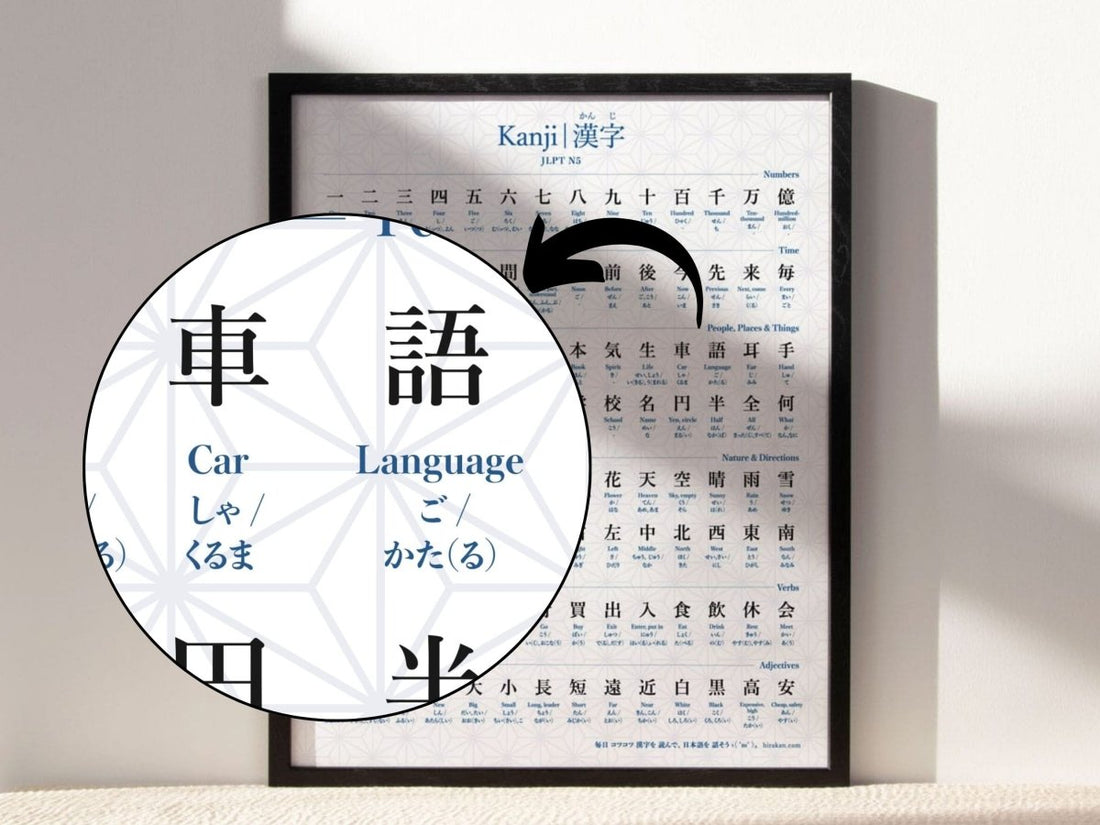
Is it Necessary to Learn Kanji? The Last Answer You'll Ever Need
Share
Many beginners in Japanese wonder whether they should really learn kanji. I know this, because I also wondered when starting my Japanese learning journey. Actually, rather than wondering, I did everything possible to avoid them and was trying to hang on every reason not to learn them.
"If I know hiragana and katakana, it's enough to read"
"I don't need to read kanji to be able to speak"
"There are too many kanji anyway and my time is better used learning a new grammar point or something else"
Well, unfortunately for my young-self and in answer to all the good remarks, yes, learning kanji is necessary.
But the good news is, you don't have to follow old textbook methods. You might even be able to skip some crucial elements that you couldn't skip a few years ago. In this article I'll also give you the best resources to learn kanji.
Let's go.
What is Kanji?
Kanji is one of the three scripts used in Japanese, alongside hiragana and katakana.
While hiragana and katakana cover sounds (e.g. "a, i, u, e, o") and can be learned in a few weeks, kanji convey meaning, and are pronounced with sounds made of hiragana. And each kanji represents an idea or concept.
Why Should You Learn Kanji?
- Kanji is the Japanese alphabet. I think anybody would recommend to someone wanting to learn English to learn to read the latin alphabet. It is the same here.
- Understanding the full language. Japanese is a rich language, and kanji is a big part of it. Many words in Japanese have the same sound but different meanings, which kanji help distinguish. A good example would be 漢字 and 感じ. Both are read かんじ or "kanji". But the first one means Kanji (the topic of this blog post), the second one means "feeling".
- Kanji is used everywhere in Japan and in Japanese content. Without kanji, you will find it hard to read Japanese texts, be it emails, books, websites, restaurant menus, street signs and store signs, and even people's names.
- Kanji is much easier to read than hiragana. Ok, this one is weird if you're starting Japanese. But yes, I promise, kanji is much easier to read. There are not a lot of space or punctuation in Japanese. Kanji helps with distinguishing words. Also with a meaning directly attached to each kanji, you make out the sense of the word much faster than by reading hiragana that only convey the sound.
The Debate: Do You Really Need Kanji in the Digital Age?
Some argue that in the digital age, with translation tools like Google Translate and phonetic scripts, you might get by without kanji.
It’s true that for occasionally translating a restaurant menu or read an article on a Japanese website, you might not need to learn kanji and just use technology instead.
However, for a deeper understanding and a fuller experience of the language, kanji is unavoidable. And if you're learning Japanese, it's probably because you intend to use it. If you intend to use it, you'll need kanji.
How Many Kanji Do You Really Need to Learn?
Ok, now I said that yes, you absolutely have to learn kanji. But I didn't say you needed to learn everything.
There are around 50,000 kanji in total. But there are only 2,136 kanji that are labelled as "commonly-used". They're the Jōyō kanji. They're the kanji taught in school to Japanese kids.
Now out of these 2,136 kanji (that you will need to learn if you want to be fluent), you can focus on the most common ones first.
A lot of kanji appear in just one or two words, or in a lot of topic-specific words that you might not even use in daily life.
Depending on the level of proficiency you're aiming to reach, you might get by by only learning around 1,000 kanji.
Actually, this is the level expected of someone passing the JLPT N2, which is the level often required to be able to work in Japanese.
Do You Need to Learn How to Write Kanji?
Now this is a tricky question. Learning how to write kanji helps with memorization and definitely helps if you live in Japan, especially to fill forms and write your address on documents.
But I'd still say that no, you don't need to learn how to write kanji.
Texting with friends, emailing clients, browsing on the internet, or talking with ChatGPT don't require you to write kanji.
There are less and less opportunities to write. Actually, I barely even write in English. I type. And let's be honest, this is only going to increase in the future.
Is Learning Kanji Readings Really Necessary?
You might have heard of Kunyomi and Onyomi readings. As if it wasn't enough to have 2,136 kanji meaning to learn, you also need to learn each kanji's two pronunciations. And some have even more than two, with multiple Kunyomi and Onyomi.
Unfortunately, this question is a not a real question, because you'll have no choice but to learn the readings one way or another. You have two options here:
- Either you learn the readings directly with each new kanji. In this case, you should only focus on the common readings. Forget the rare or exceptional readings. Then when you see a new word with kanji you've learned, you'll be able to read it and maybe even guess its meaning.
- You decide not to learn the Kunyomi and Onyomi readings with the kanji, but to learn only the meaning, or even just recognize the kanji (after all, Japanese kids don't learn a "meaning" with each kanji). In this case, you'll need to learn each vocabulary word individually. And with time, your brain is likely going to make the association between a kanji and a certain pronunciation naturally.
Whatever method you follow, it will end up in you knowing the kanji readings anyway.
Personally, I prefer the first method. I find it just much more pleasant to be able to read a text without knowing all the vocabulary in it first. It's also very useful if you live in Japan and are surrounded by kanji all day. Little by little, you'll find yourself being able to read more and more.
What Are The Best Apps to Learn Kanji?
Without hesitation, I'd recommend WaniKani. It is the best way to learn kanji fast and easily. And they even make it funny with their mnemonic system.
WaniKani is an SRS (Spaced Repetition System) app that teaches you the kanji, their readings, and the vocabulary associated to the kanji.
Starting with the most simple and common kanji, and going to the more rare and complicated ones. With WaniKani, you can learn all kanji in a couple of years, by using the website around one hour per day.
How to Memorize Kanji? The Last Tip You'll Ever Need
Immerse yourself. Try to read, try to surround yourself with kanji. Easier said than done, but at Hirakan, we've made Kanji posters to do just that.
You can learn directly form those posters, or use them as a support to remind yourself of the kanji, their meaning, and their Kunyomi and Onyomi readings, every time you look at it. And you don't even need to open an app for that.
It will make remembering your kanji much easier:

Check out the JLPT N5 kanji poster here.
Final Words: Is It Necessary to Learn Kanji?
So, is it necessary to learn kanji? Yes.
Kanji is the main Japanese alphabet. If you want to progress in Japanese, you cannot avoid kanji.
But learn kanji in a smart way. Choose a method that fits your learning style, and decide for yourself if you want to learn how to write them, or just typing and reading is enough.
Related Posts
-
![~に来る – Expressing ‘Come to Do (Something)’ in Japanese [JLPT N5]](//hirakan.com/cdn/shop/articles/ni-kuru-come-to-co.jpg?v=1769937520&width=170)
~に来る – Expressing ‘Come to Do (Something)’ in Japanese [JLPT N5]
Quick Summary Meaning: ~に来る (~にくる) shows that someone comes to a place in order to do something. How to Us...
-
![~に行く – Expressing ‘Go Somewhere to Do Something’ in Japanese [JLPT N5]](//hirakan.com/cdn/shop/articles/ni-iku-go-somewhere-to-do-something.jpg?v=1769937474&width=170)
~に行く – Expressing ‘Go Somewhere to Do Something’ in Japanese [JLPT N5]
Quick Summary Meaning: “Go to do (something).” You move to a place, and your main purpose is to do that action ...
-
![~にあります/~にいます – Saying Where Things and People Are in Japanese [JLPT N5]](//hirakan.com/cdn/shop/articles/ni-arimasu-imasu-location-of-existence.jpg?v=1769251504&width=170)
~にあります/~にいます – Saying Where Things and People Are in Japanese [JLPT N5]
Quick Summary Meaning: ~にあります/~にいます tells you where something or someone “exists” or “is located.” How to ...
-
![~がある・~がいる – Talking About What Exists in Japanese [JLPT N5]](//hirakan.com/cdn/shop/articles/ga-aru-iru-there-is-are.jpg?v=1769251452&width=170)
~がある・~がいる – Talking About What Exists in Japanese [JLPT N5]
Quick Summary Meaning: ~がある and ~がいる mean “there is / there are” or “to exist / to be (somewhere).” ある is for t...
-
![~すぎる – Saying Something Is “Too Much” in Japanese [JLPT N5]](//hirakan.com/cdn/shop/articles/sugiru-too-much.jpg?v=1769251408&width=170)
~すぎる – Saying Something Is “Too Much” in Japanese [JLPT N5]
Quick Summary Meaning: ~すぎる (~sugiru) means “too much” or “excessive.” It shows that something goes beyond a no...
-
![~く/~になる/~くする – Expressing Change with Adjectives in Japanese [JLPT N5]](//hirakan.com/cdn/shop/articles/ku-naru-suru-expressing-change.jpg?v=1769251371&width=170)
~く/~になる/~くする – Expressing Change with Adjectives in Japanese [JLPT N5]
Quick Summary Meaning: ~く/~になる/~くする lets you talk about how things change in state: “become ~,” “get ~,” or “make som...
-
![な形容詞 (Na-adjectives) – Basic Forms with です in Japanese [JLPT N5]](//hirakan.com/cdn/shop/articles/na-keiyoushi-basic-desu-forms.jpg?v=1769251316&width=170)
な形容詞 (Na-adjectives) – Basic Forms with です in Japanese [JLPT N5]
Quick Summary Meaning: な形容詞 (na-adjectives) are adjectives that describe what something or someone is like, sim...
-
![イ形容詞 – Basic i-Adjective Conjugations in Japanese [JLPT N5]](//hirakan.com/cdn/shop/articles/i-adjectives.jpg?v=1769251251&width=170)
イ形容詞 – Basic i-Adjective Conjugations in Japanese [JLPT N5]
Quick Summary Meaning: イ形容詞 (i-adjectives) are adjectives that end in い and describe how something is, like “big,” “q...
-
![~ます – Polite Present and Past Verb Forms in Japanese [JLPT N5]](//hirakan.com/cdn/shop/articles/masu_-_polite_verb_form.jpg?v=1767433709&width=170)
~ます – Polite Present and Past Verb Forms in Japanese [JLPT N5]
Quick Summary Meaning: The endings ~ます/~ません/~ました/~ませんでした make verbs polite in Japanese (present/future and past...
-
![よ – Adding Friendly Emphasis in Japanese [JLPT N5]](//hirakan.com/cdn/shop/articles/yo_-_ending_particle_Friendly_Emphasis.jpg?v=1767433517&width=170)
よ – Adding Friendly Emphasis in Japanese [JLPT N5]
Quick Summary Meaning: The sentence-ending particle よ adds light emphasis. It shows new information, your strong opin...
-
![ね – Softly Seeking Agreement in Japanese [JLPT N5]](//hirakan.com/cdn/shop/articles/ending_particle.jpg?v=1766907843&width=170)
ね – Softly Seeking Agreement in Japanese [JLPT N5]
Quick Summary Meaning: The particle ね is used at the end of a sentence to gently seek agreement, confirmation, ...
-
![何・だれ・いつ・どこ・どう – Basic Question Words in Japanese [JLPT N5]](//hirakan.com/cdn/shop/articles/Question_Words.jpg?v=1766907708&width=170)
何・だれ・いつ・どこ・どう – Basic Question Words in Japanese [JLPT N5]
Quick Summary Meaning: These are basic Japanese “wh-words” like “what, who, when, where, how, why, how much, ho...
-
![ここ・そこ・あそこ・どこ – Talking About Places in Japanese [JLPT N5]](//hirakan.com/cdn/shop/articles/places_fb57172a-7d06-47ee-a9b7-c1f4b6b2b264.jpg?v=1766305419&width=170)
ここ・そこ・あそこ・どこ – Talking About Places in Japanese [JLPT N5]
Quick Summary Meaning: ここ (koko) = here, そこ (soko) = there (near you), あそこ (asoko) = over there (far from both)...
-
![この・その・あの・どの – Using ‘This / That / Which’ with Nouns in Japanese [JLPT N5]](//hirakan.com/cdn/shop/articles/acd351ada3fe4b04ae86de788a3350b8.jpg?v=1766305268&width=170)
この・その・あの・どの – Using ‘This / That / Which’ with Nouns in Japanese [JLPT N5]
Quick Summary Meaning: この (kono), その (sono), あの (ano), どの (dono) mean “this / that / which” when they come dire...
-
![これ・それ・あれ・どれ – Saying ‘This / That / Which One’ in Japanese [JLPT N5]](//hirakan.com/cdn/shop/articles/this-that.jpg?v=1766305107&width=170)
これ・それ・あれ・どれ – Saying ‘This / That / Which One’ in Japanese [JLPT N5]
Quick Summary Meaning: これ (kore), それ (sore), あれ (are), and どれ (dore) all mean “this / that / which (one)” when you ar...
-
![か~か – Expressing Choices like “A or B” in Japanese [JLPT N5]](//hirakan.com/cdn/shop/articles/choices.jpg?v=1766304827&width=170)
か~か – Expressing Choices like “A or B” in Japanese [JLPT N5]
Quick Summary Meaning: The pattern か~か shows a simple choice: “A or B.” How to Use: Put か after each optio...
-
![~から~まで – Saying “From A to B” in Japanese [JLPT N5]](//hirakan.com/cdn/shop/articles/from-AtoB.jpg?v=1765093560&width=170)
~から~まで – Saying “From A to B” in Japanese [JLPT N5]
Quick Summary Meaning: ~から~まで shows the starting point and ending point of something: “from A to B.” It is ofte...
-
![まで – Expressing “Until” and “Up To” in Japanese [JLPT N5]](//hirakan.com/cdn/shop/articles/until-up-to.jpg?v=1765093405&width=170)
まで – Expressing “Until” and “Up To” in Japanese [JLPT N5]
Quick Summary Meaning: まで (made) means “until” or “up to” and shows a limit of time, place, number, or even act...
-
![から – Expressing “Because” and “From/Since” in Japanese [JLPT N5]](//hirakan.com/cdn/shop/articles/because-from_since.jpg?v=1765093285&width=170)
から – Expressing “Because” and “From/Since” in Japanese [JLPT N5]
Quick Summary Meaning: から shows a reason (“because”) or a starting point (“from / since”). How to Use: Put...
-
![や – Listing Examples with “And, Among Others” in Japanese [JLPT N5]](//hirakan.com/cdn/shop/articles/and.jpg?v=1765093138&width=170)
や – Listing Examples with “And, Among Others” in Japanese [JLPT N5]
Quick Summary Meaning: や connects two or more nouns and means “and” or “among other things.” It shows that your lis...
-
![か – Forming Questions and Saying “Or” in Japanese [JLPT N5]](//hirakan.com/cdn/shop/articles/ka-questions.jpg?v=1763787134&width=170)
か – Forming Questions and Saying “Or” in Japanese [JLPT N5]
Quick Summary Meaning: The particle か turns a sentence into a question, or can mean “or” when choosing between thin...
-
![も – Saying “Also” and “Too” in Japanese [JLPT N5]](//hirakan.com/cdn/shop/articles/mo-also-too_99f908e6-78d0-4f82-8319-391ef42764bc.jpg?v=1763787251&width=170)
も – Saying “Also” and “Too” in Japanese [JLPT N5]
Quick Summary Meaning: The particle も means “also,” “too,” or “even.” It shows that something is the same as someth...
-
![と – Linking 'And', 'With', and Quotations in Japanese [JLPT N5]](//hirakan.com/cdn/shop/articles/to-and-with-quotation.jpg?v=1763265110&width=170)
と – Linking 'And', 'With', and Quotations in Japanese [JLPT N5]
Quick Summary Meaning: と links things like “A and B,” marks doing something with someone, and shows a quotation (“…,”...
-
![で – Marking Where and How an Action Happens in Japanese [JLPT N5]](//hirakan.com/cdn/shop/articles/de-where-how-action-happens.jpg?v=1763264973&width=170)
で – Marking Where and How an Action Happens in Japanese [JLPT N5]
Quick Summary Meaning: で marks the location where an action happens or the means/tool/method used to do something...
-
![へ – Marking Direction ‘Toward’ in Japanese [JLPT N5]](//hirakan.com/cdn/shop/articles/he-marking-direction.jpg?v=1762667986&width=170)
へ – Marking Direction ‘Toward’ in Japanese [JLPT N5]
Quick Summary Meaning: The particle へ marks direction or “toward” a place or person. It points where something is hea...
-
![に – Marking Time, Destinations, and Recipients in Japanese [JLPT N5]](//hirakan.com/cdn/shop/articles/ni-marking-destination.jpg?v=1762667846&width=170)
に – Marking Time, Destinations, and Recipients in Japanese [JLPT N5]
Quick Summary Meaning: The particle に marks a point in time (at/on), a destination you reach (to/into), or a target/r...
-
![の – Possession and Noun Linking in Japanese [JLPT N5]](//hirakan.com/cdn/shop/articles/no-possession-and-noun-linking.jpg?v=1761961297&width=170)
の – Possession and Noun Linking in Japanese [JLPT N5]
Quick Summary Meaning: Links two nouns to show possession, belonging, or description. Often reads as “’s” or “of....
-
![を – Marking the Direct Object in Japanese [JLPT N5]](//hirakan.com/cdn/shop/articles/o-direct-object.jpg?v=1761960990&width=170)
を – Marking the Direct Object in Japanese [JLPT N5]
Quick Summary Meaning: を marks the direct object — the thing that receives the action of a verb. It’s pronounced ...
-
![が – Marking the Subject ('Who/What') in Japanese [JLPT N5]](//hirakan.com/cdn/shop/articles/ga-subject-marker_60f30f70-6ca5-47ee-9a00-3646195d7d3c.jpg?v=1761386355&width=170)
が – Marking the Subject ('Who/What') in Japanese [JLPT N5]
Quick Summary Meaning: The particle が marks the subject of a sentence and highlights new or focused information (an...
-
![は (wa) – Topic Marker and Contrast in Japanese [JLPT N5]](//hirakan.com/cdn/shop/articles/wa-topic-marker.jpg?v=1761385996&width=170)
は (wa) – Topic Marker and Contrast in Japanese [JLPT N5]
Quick Summary Meaning: Marks the topic of the sentence — what you’re talking about. Often feels like “as for...” in E...
-
![じゃない・ではありません – Expressing 'Is/Was Not' in Japanese [JLPT N5]](//hirakan.com/cdn/shop/articles/janai-dehaarimasen_2594963b-531e-4f4d-a9b0-361010e0a720.jpg?v=1760865884&width=170)
じゃない・ではありません – Expressing 'Is/Was Not' in Japanese [JLPT N5]
Quick Summary Meaning: The negative of the copula “to be.” Say “is not” or “was not” with nouns and na-adjectives. Ho...
-
![だ・です/だった・でした – Saying ‘to be’ in Japanese [JLPT N5]](//hirakan.com/cdn/shop/articles/da-desu-datta-deshita_58bbc732-53fd-48da-83c7-4e477e7cc0b2.jpg?v=1760864506&width=170)
だ・です/だった・でした – Saying ‘to be’ in Japanese [JLPT N5]
Quick Summary Meaning: The Japanese copula — the basic “to be.” It links a topic to a noun or a na-adjective to state...
-
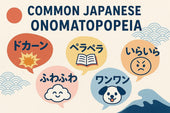
Common Japanese Onomatopoeia: Essential Words You’ll Hear Everywhere
If you spend any time in Japan, you’ll hear onomatopoeia everywhere: on TV, in everyday conversations, in manga, and ...
-
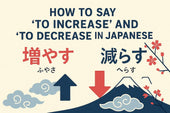
How to Say “To Increase” and “To Decrease” in Japanese: With Examples
You've noticed there are multiple ways to say “to increase” or "to decrease" in Japanese. Between transitive and intr...
-
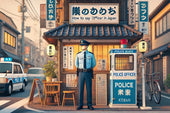
How to Say "Police Officer" in Japanese: Common Terms and Slang
There are several ways to say "police officer" in Japanese, and each one has a different level of formality and usage...
-
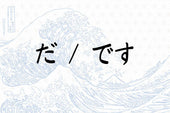
Understanding だ (da) and です (desu) in Japanese: Meaning and Usage
When learning Japanese, one of the first things you’ll come across is だ (da) and です (desu). These words don’t have a ...
-
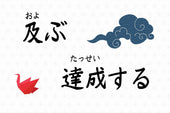
Difference Between 及ぶ (およぶ) and 達成する (たっせいする)
Both 及ぶ and 達成する can relate to "reaching" or "achieving" something, but they have distinct nuances and usage contexts...
-

JLPT N5 Study Guide: A Beginner's Roadmap to Acing the Test
If you’ve just started learning Japanese and are aiming to ace the JLPT N5, yo...
-

Beginner's Guide to Japanese Particles: Learn the Basics
TL;DR: Japanese particles are crucial for structuring sentences, acting like conjunctions or prepositions in English...
-

JLPT N5 Vocabulary List - All 748 Words You Need to Know
Vocabulary is the foundation of any language, and Japanese is no exception. The more you know, the better. Over time ...
-
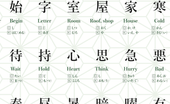
JLPT N4 Kanij List - All 176 Characters You Need To Know
After mastering the JLPT N5 kanji, you're ready to take your Japanese kanji game to the next level. JLPT N4. Let's go...
-
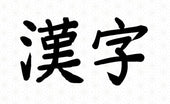
Kanji For Kanji - 漢字
Inception time. Which kanji compose the kanji of "kanji"? The kanji for "kanji" is actually pretty straightforward. I...
-

How to Memorize Katakana Easily: 9 Tips for Beginners
For those diving into Japanese, mastering hiragana and katakana is the first significant challenge. While hiragana o...
-
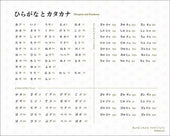
Complete Hiragana and Katakana Chart With All 112 Characters
The very first step for everybody who wants to learn Japanese is to study the hiragana and katakana chart (before lea...
-
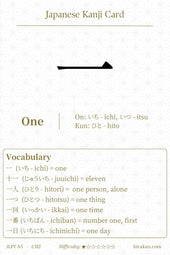
JLPT N5 Kanji: Kanji For One 一 (ichi)
Probably one the most simple kanji to remember, the kanji for 'one' is simply written '一'. Let's see its readings and...
-
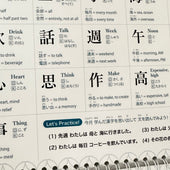
How Long Does It Take to Learn Kanji? A Beginner's Guide
Ask any Japanese student what's the scariest part of learning the language, and they'll say kanji. And they're righ...
-

How Long Does it Take to Learn Hiragana and Katakana?
As a beginner in Japanese, your first step is diving into the alphabets of Hiragana and Katakana. These are the build...
-

13 Best YouTube Channels to Learn Japanese, From Beginner to Intermediate
YouTube can be an incredible resource for learning Japanese. And best of all, it's free. So we've compiled a list of ...
-
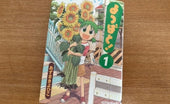
Top 10 Manga for Japanese Language Learners: From Beginners to Intermediates!
If you're learning Japanese, chances are you're interested in manga. So instead of reading texts about Tanaka-san s...
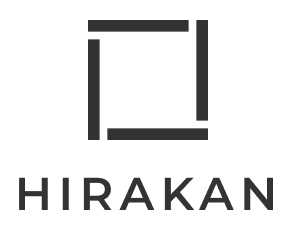
![~に来る – Expressing ‘Come to Do (Something)’ in Japanese [JLPT N5]](http://hirakan.com/cdn/shop/articles/ni-kuru-come-to-co.jpg?v=1769937520&width=170)
![~に行く – Expressing ‘Go Somewhere to Do Something’ in Japanese [JLPT N5]](http://hirakan.com/cdn/shop/articles/ni-iku-go-somewhere-to-do-something.jpg?v=1769937474&width=170)
![~にあります/~にいます – Saying Where Things and People Are in Japanese [JLPT N5]](http://hirakan.com/cdn/shop/articles/ni-arimasu-imasu-location-of-existence.jpg?v=1769251504&width=170)
![~がある・~がいる – Talking About What Exists in Japanese [JLPT N5]](http://hirakan.com/cdn/shop/articles/ga-aru-iru-there-is-are.jpg?v=1769251452&width=170)
![~すぎる – Saying Something Is “Too Much” in Japanese [JLPT N5]](http://hirakan.com/cdn/shop/articles/sugiru-too-much.jpg?v=1769251408&width=170)
![~く/~になる/~くする – Expressing Change with Adjectives in Japanese [JLPT N5]](http://hirakan.com/cdn/shop/articles/ku-naru-suru-expressing-change.jpg?v=1769251371&width=170)
![な形容詞 (Na-adjectives) – Basic Forms with です in Japanese [JLPT N5]](http://hirakan.com/cdn/shop/articles/na-keiyoushi-basic-desu-forms.jpg?v=1769251316&width=170)
![イ形容詞 – Basic i-Adjective Conjugations in Japanese [JLPT N5]](http://hirakan.com/cdn/shop/articles/i-adjectives.jpg?v=1769251251&width=170)
![~ます – Polite Present and Past Verb Forms in Japanese [JLPT N5]](http://hirakan.com/cdn/shop/articles/masu_-_polite_verb_form.jpg?v=1767433709&width=170)
![よ – Adding Friendly Emphasis in Japanese [JLPT N5]](http://hirakan.com/cdn/shop/articles/yo_-_ending_particle_Friendly_Emphasis.jpg?v=1767433517&width=170)
![ね – Softly Seeking Agreement in Japanese [JLPT N5]](http://hirakan.com/cdn/shop/articles/ending_particle.jpg?v=1766907843&width=170)
![何・だれ・いつ・どこ・どう – Basic Question Words in Japanese [JLPT N5]](http://hirakan.com/cdn/shop/articles/Question_Words.jpg?v=1766907708&width=170)
![ここ・そこ・あそこ・どこ – Talking About Places in Japanese [JLPT N5]](http://hirakan.com/cdn/shop/articles/places_fb57172a-7d06-47ee-a9b7-c1f4b6b2b264.jpg?v=1766305419&width=170)
![この・その・あの・どの – Using ‘This / That / Which’ with Nouns in Japanese [JLPT N5]](http://hirakan.com/cdn/shop/articles/acd351ada3fe4b04ae86de788a3350b8.jpg?v=1766305268&width=170)
![これ・それ・あれ・どれ – Saying ‘This / That / Which One’ in Japanese [JLPT N5]](http://hirakan.com/cdn/shop/articles/this-that.jpg?v=1766305107&width=170)
![か~か – Expressing Choices like “A or B” in Japanese [JLPT N5]](http://hirakan.com/cdn/shop/articles/choices.jpg?v=1766304827&width=170)
![~から~まで – Saying “From A to B” in Japanese [JLPT N5]](http://hirakan.com/cdn/shop/articles/from-AtoB.jpg?v=1765093560&width=170)
![まで – Expressing “Until” and “Up To” in Japanese [JLPT N5]](http://hirakan.com/cdn/shop/articles/until-up-to.jpg?v=1765093405&width=170)
![から – Expressing “Because” and “From/Since” in Japanese [JLPT N5]](http://hirakan.com/cdn/shop/articles/because-from_since.jpg?v=1765093285&width=170)
![や – Listing Examples with “And, Among Others” in Japanese [JLPT N5]](http://hirakan.com/cdn/shop/articles/and.jpg?v=1765093138&width=170)
![か – Forming Questions and Saying “Or” in Japanese [JLPT N5]](http://hirakan.com/cdn/shop/articles/ka-questions.jpg?v=1763787134&width=170)
![も – Saying “Also” and “Too” in Japanese [JLPT N5]](http://hirakan.com/cdn/shop/articles/mo-also-too_99f908e6-78d0-4f82-8319-391ef42764bc.jpg?v=1763787251&width=170)
![と – Linking 'And', 'With', and Quotations in Japanese [JLPT N5]](http://hirakan.com/cdn/shop/articles/to-and-with-quotation.jpg?v=1763265110&width=170)
![で – Marking Where and How an Action Happens in Japanese [JLPT N5]](http://hirakan.com/cdn/shop/articles/de-where-how-action-happens.jpg?v=1763264973&width=170)
![へ – Marking Direction ‘Toward’ in Japanese [JLPT N5]](http://hirakan.com/cdn/shop/articles/he-marking-direction.jpg?v=1762667986&width=170)
![に – Marking Time, Destinations, and Recipients in Japanese [JLPT N5]](http://hirakan.com/cdn/shop/articles/ni-marking-destination.jpg?v=1762667846&width=170)
![の – Possession and Noun Linking in Japanese [JLPT N5]](http://hirakan.com/cdn/shop/articles/no-possession-and-noun-linking.jpg?v=1761961297&width=170)
![を – Marking the Direct Object in Japanese [JLPT N5]](http://hirakan.com/cdn/shop/articles/o-direct-object.jpg?v=1761960990&width=170)
![が – Marking the Subject ('Who/What') in Japanese [JLPT N5]](http://hirakan.com/cdn/shop/articles/ga-subject-marker_60f30f70-6ca5-47ee-9a00-3646195d7d3c.jpg?v=1761386355&width=170)
![は (wa) – Topic Marker and Contrast in Japanese [JLPT N5]](http://hirakan.com/cdn/shop/articles/wa-topic-marker.jpg?v=1761385996&width=170)
![じゃない・ではありません – Expressing 'Is/Was Not' in Japanese [JLPT N5]](http://hirakan.com/cdn/shop/articles/janai-dehaarimasen_2594963b-531e-4f4d-a9b0-361010e0a720.jpg?v=1760865884&width=170)
![だ・です/だった・でした – Saying ‘to be’ in Japanese [JLPT N5]](http://hirakan.com/cdn/shop/articles/da-desu-datta-deshita_58bbc732-53fd-48da-83c7-4e477e7cc0b2.jpg?v=1760864506&width=170)
















